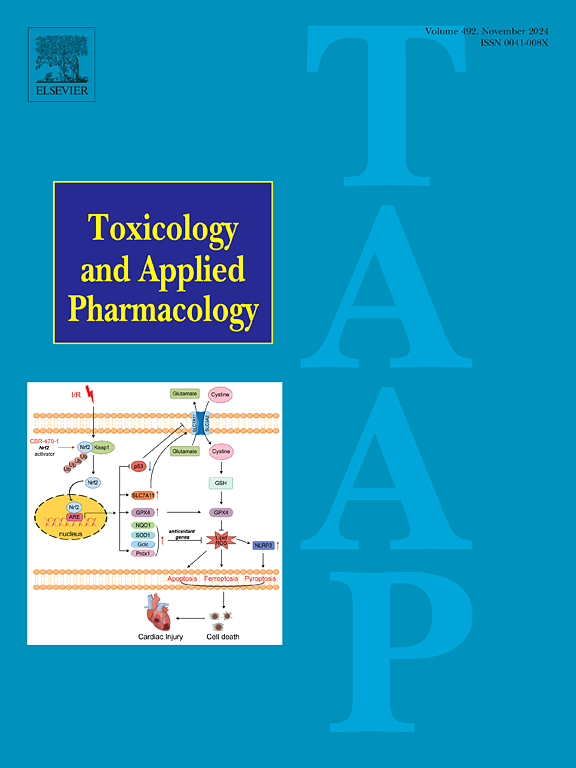Ran drives pancreatic cancer metastasis by activating the osteopontin-PI3K/AKT-androgen receptor signaling cascade
IF 3.3
3区 医学
Q2 PHARMACOLOGY & PHARMACY
引用次数: 0
Abstract
The small GTPase Ran has emerged as a key player in cancer metastasis. Our previous studies demonstrated that Ran drives pancreatic cancer metastasis by modulating androgen receptor (AR) expression. However, the detailed mechanisms by which Ran regulates AR expression remain unclear. This study aimed to elucidate the regulatory mechanisms through which Ran influences AR expression in the context of pancreatic cancer metastasis. We observed elevated levels of Ran, osteopontin (OPN), and AR in metastatic lymph node tissues, with OPN positively correlated with either Ran or AR expression. Ran silencing led to decreased levels of OPN and AR, whereas Ran upregulation increased their expression. Notably, OPN overexpression restored AR levels in Ran-silenced cells, whereas OPN knockdown diminished the inductive effect of Ran on AR expression. Additionally, OPN knockdown decreased AR expression and was associated with reduced activation of the PI3K/AKT signaling pathway. Functional assays revealed that silencing OPN significantly impaired the mobility and invasion of pancreatic cancer cells and restricted hepatic metastasis. Conversely, OPN overexpression restored the impaired metastasis caused by Ran knockdown. Furthermore, inhibiting PI3K/AKT signaling abolished the promoting effects of either Ran or OPN on pancreatic cancer metastasis. Importantly, re-expressing AR reversed the inhibitory effects of Ran or OPN silencing on the mobility and invasion of pancreatic cancer cells. In summary, Ran induces AR expression through the regulation of the OPN-PI3K/AKT signaling cascade. The Ran-OPN-PI3K/AKT-AR signaling pathway is crucial for driving pancreatic cancer metastasis.

Ran通过激活骨桥蛋白- pi3k / akt -雄激素受体信号级联来驱动胰腺癌转移。
小的GTPase Ran在癌症转移中发挥了关键作用。我们之前的研究表明Ran通过调节雄激素受体(AR)的表达来驱动胰腺癌转移。然而,Ran调控AR表达的具体机制尚不清楚。本研究旨在阐明Ran在胰腺癌转移过程中影响AR表达的调控机制。我们观察到转移性淋巴结组织中Ran、骨桥蛋白(OPN)和AR水平升高,OPN与Ran或AR表达呈正相关。Ran沉默导致OPN和AR水平降低,而Ran上调则增加了它们的表达。值得注意的是,在Ran沉默的细胞中,OPN过表达恢复了AR水平,而OPN敲低则减弱了Ran对AR表达的诱导作用。此外,OPN敲低可降低AR表达,并与PI3K/AKT信号通路的激活降低相关。功能分析显示,沉默OPN可显著降低胰腺癌细胞的移动性和侵袭性,并限制肝转移。相反,OPN过表达恢复了Ran敲低引起的转移受损。此外,抑制PI3K/AKT信号通路可消除Ran或OPN对胰腺癌转移的促进作用。重要的是,重新表达AR逆转了Ran或OPN沉默对胰腺癌细胞迁移和侵袭的抑制作用。综上所述,Ran通过调控OPN-PI3K/AKT信号级联诱导AR表达。Ran-OPN-PI3K/AKT-AR信号通路对胰腺癌转移至关重要。
本文章由计算机程序翻译,如有差异,请以英文原文为准。
求助全文
约1分钟内获得全文
求助全文
来源期刊
CiteScore
6.80
自引率
2.60%
发文量
309
审稿时长
32 days
期刊介绍:
Toxicology and Applied Pharmacology publishes original scientific research of relevance to animals or humans pertaining to the action of chemicals, drugs, or chemically-defined natural products.
Regular articles address mechanistic approaches to physiological, pharmacologic, biochemical, cellular, or molecular understanding of toxicologic/pathologic lesions and to methods used to describe these responses. Safety Science articles address outstanding state-of-the-art preclinical and human translational characterization of drug and chemical safety employing cutting-edge science. Highly significant Regulatory Safety Science articles will also be considered in this category. Papers concerned with alternatives to the use of experimental animals are encouraged.
Short articles report on high impact studies of broad interest to readers of TAAP that would benefit from rapid publication. These articles should contain no more than a combined total of four figures and tables. Authors should include in their cover letter the justification for consideration of their manuscript as a short article.

 求助内容:
求助内容: 应助结果提醒方式:
应助结果提醒方式:


